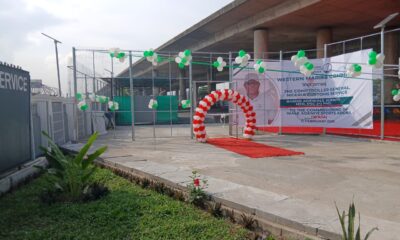Analysis
Impending Customs Management Mass Retirement: A Structural Crossroad

BY EGUONO ODJEGBA
A circular dated September 19, 2025, marked HRD/2025/048, has triggered concerns about a seismic shift within the Nigeria Customs Service (NCS). The circular lists 825 senior officers—including five Deputy Comptroller Generals (DCGs), 15 Assistant Comptroller Generals (ACGs), and dozens of Comptrollers for statutory retirement by 2026.
The directive enforces pre-retirement leave starting September 2026, with strict warnings against lobbying for extensions. This move which aligns with Public Service Rules is however unprecedented in scale, effectively dismantling the current top echelon of the Service.
Core Issues At Stake
- Succession Planning Deficit
The NCS has long struggled with institutional succession planning where promotions have often been reactive rather than strategic, leaving a vacuum when senior officers exit en masse. The lack of a structured mentorship pipeline means junior officers may ascend without adequate grooming, risking operational inefficiencies.
- Double Promotions and “Accidental Leadership”
To fill the leadership void, the Comptroller General of Customs (CGC) may resort to promoting Comptrollers and Deputy Comptrollers rapidly—sometimes skipping ranks.
While this may plug gaps, it risks creating “accidental leaders” who lack the experience, institutional memory, and strategic depth required for high-level decision-making.
- Loss of Professional Corps
It is believed that the retiring officers represent the last generation of what analysts call the “professional corps”—those trained in traditional customs values of service, discipline, and trade facilitation.
Concerned quarters believe that their exit marks a generational shift toward a digital customs era without adequate transition planning, and that this could lead to cultural and operational dissonance.
Likely Consequences
Operational Disruption:
Those whose business it is to know say Customs operations, especially enforcement, valuation, and clearance may suffer from inconsistent leadership and decision-making.
That junior officers may struggle with complex trade facilitation issues, leading to delays and increased complaints from stakeholders.
Institutional Memory Loss:
That the exit of seasoned officers could erase decades of tacit knowledge, weakening the Service’s ability to respond to nuanced trade and border challenges.
Revenue Generation Risks:

Analysts say that since Customs has become a major revenue earner for Nigeria, leadership instability could affect revenue targets, especially if new officers prioritize short-term gains over strategic compliance enforcement.
Training and Ethics Challenges
There is also worry that without robust training programs, newly promoted officers may lack the ethical grounding and technical competence needed for their roles. And this logically could exacerbate issues of corruption, poor customer service, and regulatory lapses.
Cultural Shift and Identity Crisis:
Concerns also hint that the transition from a traditional customs ethos to a digital-first model may be jarring and that without a clear roadmap, the Service risks losing its institutional identity.
It must be mentioned that the NCS has faced similar retirement-related shakeups in the past, though not always on the same scale as the current wave.
Between 2023 and 2024 there were allegations of violations of retirement rules, prompting the raising of alarms by civil society groups like the Societal Safety Network (SSN) about senior officers allegedly refusing to proceed on terminal leave, in violation of the 2023 Customs Act and the civil service rules.
These incidents were seen as obstructing the promotion of junior officers and disrupting the organizational structure. The refusal to retire was believed to have created bottlenecks in leadership succession and recruitment process.
Part of the consequences manifested in observed leadership gridlock as officers due for retirement but who remained in office delayed the elevation of qualified juniors, causing frustration and stagnation within the ranks.
The ensuing leadership vacuum and delayed promotions were believed to have led to lapses in enforcement, trade facilitation, and revenue collection. Despite that Nigeria is a peculiar environment where the enforcement of rules suffers narrow interpretations, it is best that standard procedure is applied that respects no individual prejudices.
More so, since delays or resistance to retirement have historically led to internal friction and public distrust; the rules of engagement should be allowed to run its course, regardless of reactive promotions.
We know from history that once retirements are enforced,very often the Service resorts to rapid promotions to fill gaps, sometimes elevating officers without adequate preparation, a fact that is echoing the present concerns. But since there is always a divide in how the public reacts to such developments, different perceptions and desires cannot be ruled out. Going forward, the only anti-dote to maintaining a balance is the need for a transparent succession planning which the management by this circular have taken bold steps to achieve.
The current leadership and management is therefore deserving of commendation since the absence of a clear roadmap for leadership transition has repeatedly exposed the Service to instability, hitherto. To achieve a transparent transition process, merit based promotion is key, which eloquently highlights the importance of the just concluded promotion exercise.
This is more so since past episodes show that skipping ranks or promoting underprepared officers can erode professionalism and morale. The current wave of retirements is more structured and preemptive, but it still risks repeating past mistakes if not accompanied by strategic planning and institutional reforms.
The NCS stands at a critical juncture—either to evolve into a modern, merit-driven agency or to continue to fall into cycles of reactive leadership and operational fragility.
What Needs To Happen
The current leadership and management should emphasize strategic succession planning. To achieve this, NCS must urgently develop a structured leadership pipeline with clear benchmarks for promotion and mentorship.
Next is capacity building that encapsulates intensive training programmes and which should be rolled out for mid-level officers to prepare them for higher responsibilities.
Increased stakeholder engagement and ethical reorientation is also key. Here, Abuja must reassure trading partners and the public of its readiness to continue to maintain professionalism and efficiency, with a renewed focus on ethics and service values to prevent the erosion of public trust.
But of course, this moment is both a challenge and an opportunity for the Nigeria Customs Service. If handled with foresight, it could usher in a new era of reform and modernization. If mismanaged, it risks institutional fragility at a time when Nigeria needs robust trade enforcement more than ever before.































